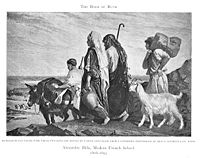Naomi
Naomi (Hebrew: נעמי, Noʻomī; "Name means::pleasant") was the wife of Elimelech and mother-in-law of Ruth.[1][2][3][4]
History
Bereavement
Famine was a common threat in the land of Israel. About twenty years after Ehud fought a war of liberation against Moab, Elimelech traveled to Moab with his wife and sons.
In 2682 AM, Elimelech died. Then Mahlon and Chilion each married a local woman; Chilion married Orpah and Mahlon married Ruth. Ten years later, Mahlon and Chilion died also. At about this time, the famine in Israel had passed, so Naomi planned to return there. (Ruth 1:1-6 )
Naomi now urged Orpah and Ruth to return, each to her father's house. They protested that they wanted to remain with her. Then Naomi told them some harsh truths: that she was unable to provide for them, and she also had no sons left to make levirate marriages with Orpah and Ruth.[5] She further stated that even if she found another man to marry her, she could not raise sons for them to marry for at least twenty years, and she could not ask either of them to wait that long.
Orpah returned to her father's house, but Ruth steadfastly refused to return. She then made a declaration of fidelity to the people of Israel and faith in God. She even said that she hoped to die and be buried in Israel. Faced with such a profession of faith and devotion, Naomi could not argue with Ruth anymore, and allowed Ruth to return with her to Bethlehem, the town where she had been born. (Ruth 1:7-18 )
The harvest
Naomi and Ruth arrived in Bethlehem in the month of the barley harvest. Elimelech had probably been a prominent man in Bethlehem, because the townspeople noticed her return. She asked everyone not to call her Naomi anymore, but to call her Mara (Hebrew: מרא, Mārā) (Ruth 1:19-22 )
Soon after their arrival, Ruth showed that she knew what she was doing. She asked Naomi's permission to obtain grain by gleaning. Gleaning was the public-welfare system of the time: those too poor to have their own land could gather whatever part of any harvest the reapers left on the ground, and the reapers were instructed not to slow their progress to gather every last fruit or seed, but to leave enough for the gleaners to gather.
Naomi allowed Ruth to find a field to glean in. That evening, Ruth came back with an ephah (roughly a bushel) of barley. Naomi asked Ruth where she had been able to glean so much in one day, and Ruth told her a story that she found delightfully incredible. The owner of the field was Boaz, who was a near relative of Elimelech (probably his great-uncle). Furthermore, Boaz had given her permission to glean close behind his reapers until he had completed all his harvests, including those of barley and of wheat.
Redemption
Naomi had, of course, told Ruth that a levirate marriage would be impossible, because Naomi's husband and sons were dead. But Naomi now decided to seek a secure situation for Ruth by means of another law: the law of kinship redemption. This law provided that the nearest male relative of any person forced by circumstance to sell his estate must buy the estate, if he could, so that the estate would stay within the family.[6] A man in a position so to act was called a redeemer (Hebrew: גאל, gaʼal).
Naomi's next recommendation to Ruth is controversial. She told Ruth to wash and anoint herself, put on her most attractive attire, and secretly attend the winnowing party on the threshing floor of Boaz. Boaz would lie down among the piles of grain, and Ruth was to uncover his feet and lie down next to him. Naomi then said that Boaz would tell her what to do next.
Ruth went to the winnowing party, and came back the next morning with six measures of barley. She said that Boaz had told her that Elimelech had another, slightly closer living relative, and Boaz would ask him in the morning whether he was willing to redeem the estate. (Ruth 3 )
Naomi advised Ruth to wait, and that she would not have to wait long, because Boaz would not let such a matter rest. On that day, Boaz asked the near relative before witnesses whether he was willing to redeem Elimelech's estate. The other man would have been willing, but he was not willing to marry Ruth and raise a son to inherit that estate. So he formally renounced his right of redemption in favor of Boaz, and Boaz married Ruth. (Ruth 4:1-12 )
In the next spring, Obed was born to Ruth and Boaz, and the residents of Bethlehem acclaimed his birth, saying,
"A son has been born to Naomi!" - Ruth 4:17
Naomi nursed Obed, who later became the grandfather of King David.
Genealogy
Naomi married Elimelech probably during the administration of Judge Ehud. They had two sons, Mahlon and Chilion.
| Salmon | Rahab | ||||||||||||||||||||||||||||||||||||||
| Grandfather | |||||||||||||||||||||||||||||||||||||||
| Father | Uncle | ||||||||||||||||||||||||||||||||||||||
| wife of::Elimelech | Naomi | No-name | |||||||||||||||||||||||||||||||||||||
| Orpah | mother of::Chilion | mother of::Mahlon | Ruth | Boaz | |||||||||||||||||||||||||||||||||||
| Obed | |||||||||||||||||||||||||||||||||||||||
 Browse |
References
- ↑ Blank W, "Naomi," Daily Bible Study, n.d. Accessed January 21, 2009.
- ↑ Hirsch EG and Seligsohn M, "Naomi," The Jewish Encyclopedia, 1906. Accessed January 21, 2009.
- ↑ Barton GA, et al., "Ruth, Book of," The Jewish Encyclopedia, 1906. Accessed January 20, 2009.
- ↑ Sullivan D, "Naomi and Ruth," Biblical Lives to Go By, n.d. Accessed January 21, 2009.
- ↑ Schechter S and Jacobs J, "Levirate marriage," The Jewish Encyclopedia, 1906. Accessed January 20, 2009.
- ↑ Jacobs J, et al., "Go'el," The Jewish Encyclopedia, 1906. Accessed January 20, 2009.
| |||||||||||||||||||||||
| ||||||||||||||||||||||||||||||||




